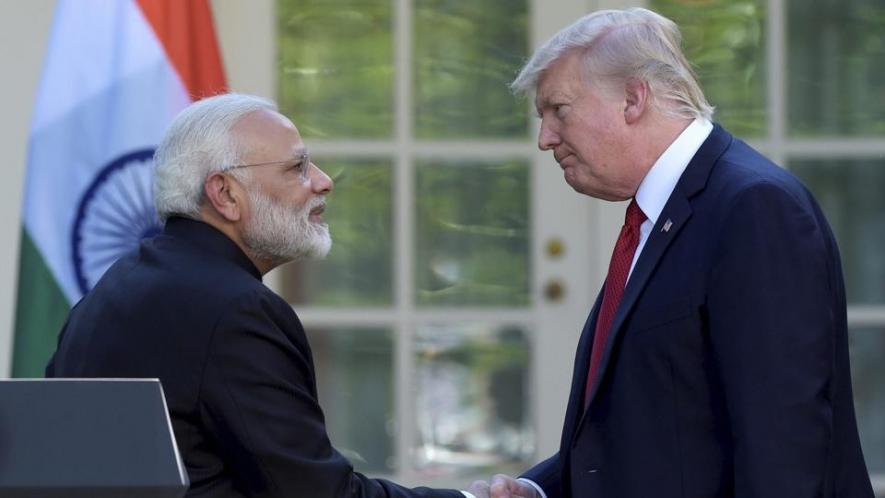India is Not America’s New-Pakistan in South Asia

Trump’s flip-flops on Pakistan are no different than Modi’s wild-vacillations on Pakistan front. In August, Trump severely criticised Pakistan; in October, he has praised it as a “fantastic country, fantastic place of fantastic people”. Verbal flowers were bestowed on Pakistan after it helped gain the release of an American woman and her family held captive by Haqqani terrorist group. The family was abducted five years ago while hiking in Afghanistan. Trump’s team is celebrating the intelligence cooperation extended by ISI as a success of its policy to get Pakistan back on track. Trump believes that Pakistani government’s cooperation is a sign that the country is “starting to respect the United States again.” Much like Modi, Trump is trying to show that his policy initiatives are unique and restoring American glory that had been lost under the previous regimes.
In August, while announcing his administration’s South Asia and Afghanistan policy, Trump was highly critical of the Pakistani government’s efforts to fight terrorist groups. He lambasted Pakistan for providing safe havens to "agents of chaos”. He categorically blamed Islamabad for harbouring the organisations involved in killing Americans. Trump had said, “We have been paying Pakistan billions and billions of dollars at the same time they are housing the very terrorists that we are fighting. But that will have to change, and that will change immediately.”
Responding to Trump’s diatribe against Pakistan, its foreign minister, Khwaja Muhammad Asif accused America of indulging in ‘use and throw’ policy vis-à-vis Pakistan to achieve American strategic objectives. Asif clearly stated, “we were used and discarded,” in the proxy war that America launched against the Soviet Union in the 1980s. Refusing to accept the entire blame for the rise of extremism and terrorism in the region Asif said, “It is a collective sin or mistake that we made.”
Asif has revealed no secret, the American lethal and non-lethal assistance to Taliban and other terrorist networks is now a folklore. Its blatant use of political Islam against the so-called “God-less communism” is also well documented. Former British foreign secretary, Robin Cook, told the House of Commons that Al Qaeda was unquestionably a product of Western intelligence agencies and Al Qaeda, an abbreviation of “the database” in Arabic, “was originally the computer database of the thousands of Islamist extremists, who were trained by the CIA and funded by the Saudis, in order to defeat the Russians in Afghanistan.”
The world is watching the same CIA game in Syria and Iraq. According to a US historian Webster Tarpley, “The Islamic State (ISIS) is a secret army of the United States and Abu Bakr al-Baghdadi, a leader of the terrorist group, is a close friend of US Senator John McCain.” Despite reports of CIA’s direct involvement in raising and supporting ISIS against the Syrian government, the global corporate media is consistently engaged in creating a perception that America is fighting against militant Islam.
The US is brazenly encouraging the Islamic State. It is doing everything to prevent the emergence of a viable and credible alliance between Russia, Syria, Turkey and Iran that can launch decisive action against ISIS. US wants Turkey to remain away from Russia and Iran. Washington is using the terrorist groups in Syria as a tool to divide the countries of the region, primarily to appease and secure Israel.
LET’S AVOID PLAYING THE US GAME
The Indian foreign policy establishment that dives deep to understand every little move in South China Sea and Beijing, for some reason, feigns ignorance of the games US plays. New Delhi often talks about Pakistan and terrorism, but conveniently ignores the deep-rooted connections that South Asian terrorism has with Washington. David Hadley, one of the master minds of 26/11 terror attacks in Mumbai, is mentioned in India but only in muted voices. America is never held responsible for Hadley’s actions. He is seen purely as an independent actor. It is primarily this flaw in our understanding of terrorism that is one of the reasons behind repeated terrorist strikes against us. New Delhi think-tanks have never researched on US-Pakistan nexus in fomenting South-Asian terrorism. There is no attempt to explore the American moorings of the Pakistani military as well as its civilian elite. The latest obfuscation technique employed by the Indian strategic elite is to blame China for Pakistan’s misdemeanors. The China as Pakistan’s “all weather friend” is being popularised, to ease the embrace of America by India. A perception is being created that all our problems, including Pakistan, are either because of China or Islam.
There is no attempt by Modi’s foreign policy experts to imagine new ways of creating peace in the region, that is so essential for India’s development. All efforts are directed at maintaining hostility with China and Pakistan. Even goodwill gestures are seen as an opportunity to score brownie points against neighbours. Discovering new areas of dispute with China is the new normal among the Indian strategic community.
The international developments and the rise of Eurasia is offering India new opportunity to crave a different future for the region, free of Anglo-American imperial influences that have plagued the region for centuries and kept the people of India, China and Pakistan from interacting at the borders.The developing relations between Russia and China and their efforts to integrate the region can help reduce extra-territorial presence in the region. India must take advantage of these changes.
The 2017 Shanghai Cooperation Organisation (SCO) summit, held from June 8-9 in Astana, the capital of Kazakhstan formally admitted New Delhi and Islamabad as full members. SCO which was formed in 2001 is fundamentally different from the Baghdad Pact that was erected by the US in 1955. The pact which had Turkey, Iraq, Great Britain, Pakistan and Iran as its members was designed to keep India and Pakistan apart. SCO does not have extra regional actors and is therefore not obliged to cater to their interests. SCO can help improve bilateral relations in the region. SCO is expected to help achieve greater trade and peace in the region because it is in the mutual interest of its members that consists of Kazakhstan, Kyrgyzstan, India, Pakistan, Russia, Tajikistan and Uzbekistan. Afghanistan, Belarus, Iran and Mongolia enjoy observer status in the SCO.
However, America is happy with the entry of both Pakistan and India into SCO grouping because it sees the Indo-China and Indo-Pak animosity to keep the forum divided. According to RAND corporation, a US based think-tank, “India's entry could especially frustrate Beijing because of rising geopolitical competition between the Asian giants and different approaches to counter-terrorism.” America that sees India as its ‘New Pakistan’ in the subcontinent is confident that its interests will be looked after in the region. With Modi at the helm, America is sanguine that China will “face an increasing amount of divisiveness within a regional economic and security organisation accustomed to extreme comity and cooperative discussions”.
Just as America projects itself to be the greatest warrior in war against terrorism, similarly, it never stops singing paeans about peace in South Asia. It has been deeply entrenched into Pakistani polity and military for more than 60 years, yet it has neither been able to prevent Pakistani aided terrorism nor keep its nuclear ambitions under a lid.
Now, the US policy experts in Carnegie are advising India to refrain from talking to Pakistan. Carnegie finds “international community’s routine calls for continuous India-Pakistan dialogue are not only misguided but also counter-productive.” It wants India to believe that there is nothing that can be discussed or negotiated with Pakistan because the discord is “fueled by Pakistan’s irredentism, its army’s desire to subvert India’s ascendency as a great power and exact revenge for past Indian military victories, and its aspirations to be treated on par with India,” irrespective of the power and economic symmetries between the two. Carnegie’s arguments against Indo-Pak talks are not new, one hears such views on Indian news channels almost daily.
If Modi administration wants peace in the region than it will have to distance itself from the knowledge houses that take their feed directly from Washington. It will have to sit-down with Pakistani counterparts and discuss the ways and means on how to enhance Islamabad’s strategic autonomy and how to prevent New Delhi from becoming another Islamabad in American scheme of things.
Disclaimer: The views expressed here are the author's personal views, and do not necessarily represent the views of Newsclick.
Get the latest reports & analysis with people's perspective on Protests, movements & deep analytical videos, discussions of the current affairs in your Telegram app. Subscribe to NewsClick's Telegram channel & get Real-Time updates on stories, as they get published on our website.
























